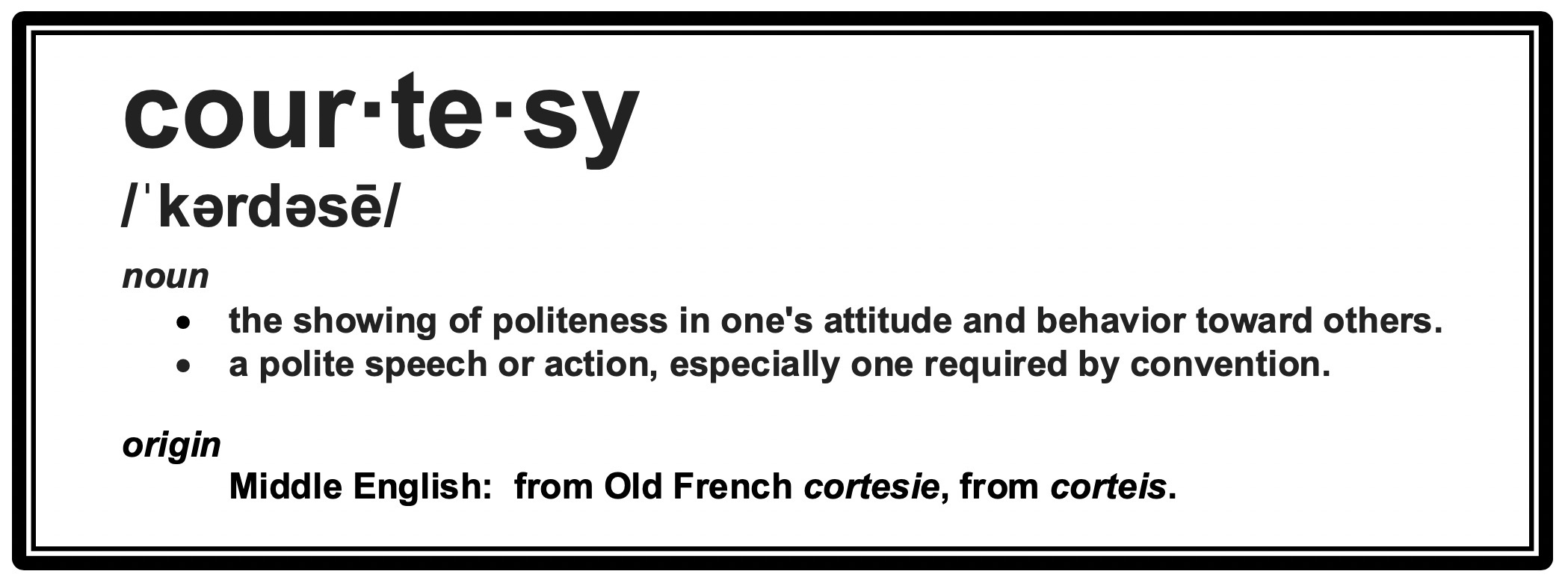Treasure Valley Classical Academy was founded to develop students in both mind and character. The school’s virtues are the guiding principles used to promote and nurture good character: courage, courtesy, honesty, perseverance, self-government, and service. Our staff will be expected to model the virtues—and to encourage our students to live by them.
Courtesy is the second of the six virtues the school will seek to cultivate in our students. On the face of it, courtesy appears to be a way of demonstrating one’s manners. For example, a young lad holds open the door for a teacher and his classmates, or a young lady assists a faculty member in carrying something from the resource room, or perhaps a Kindergarten student picks up something he dropped on the cafeteria floor during lunch. Indeed, all of these are examples of mannerly acts that I have observed in students. Such displays of courtesy contribute to a culture of civility and kindness on campus, and we want to actively foster and encourage these kinds of behaviors. This seems especially worthwhile nowadays, given the often abrasive and uncivil state of our society, discourse and culture.
However, dare I say that courtesy is about more than simply being mannerly? While the dictionary defines courtesy as polite behavior, it goes a step further. Courtesy is also a “willingness or generosity in providing something that is needed.” But before one can display a generous attitude toward a need, one has to first perceive that need—which is to say that courtesy requires an individual to be outwardly focused. Here lies the intersection between courtesy and at least two of our other virtues, namely self-government and service. One has to first practice self-government to deny the natural urge to satisfy one’s self, while second, also perceive the need to serve others. For example, instead of rushing to the door to be the first to depart the cafeteria for the playground, courtesy requires both self-government to resist the race to the door, and service to hold the door open for others. Or, as I once observed in a school cafeteria, courtesy is giving up part of your own lunch…so that you can give it to a classmate who forgot his own. Thus, self-government and service enable courtesy—a generosity or willingness to respond someone else’s need.
In the Platonic dialogues, Plato refers to this type of self-denial as “ruling over oneself.” In response to Callicles’ question about what “ruling over oneself” means, Socrates responds: “A simple thing enough; just what is commonly said, that a man should be temperate and master of himself, and ruler of his own pleasures and passions.” Courtesy is not compatible with an intemperate or self-centered person. A person who self-governs has a more natural inclination to notice the needs of others.

Many of the founders wrote about the need for courtesy and morality to sustain civil society. Benjamin Franklin, for example, composed a list of 13 virtues in order to help shape his character, including temperance, sincerity, moderation and order, all of which help guide a courteous approach toward others. George Washington, while attending school in Fredericksburg, Virginia at the youthful age of fourteen, famously kept in his personal notebook a copy of some 110 “Rules of Civility.” His focus on civility and decorum carried through his entire life, and became a hallmark of his leadership style. Below are a handful of his reminders about how the practice of courteous living reveals elements of both self-government and service:
- In the presence of others sing not to yourself with a humming voice, nor drum with your fingers or feet. Speak not when others speak, sit not when others stand, and walk not when others stop.
- Turn not your back on others, especially in speaking; jog not the table or desk on which another reads or writes; lean not on anyone.
- Use no reproachful language against anyone, neither curses nor revilings.
- Speak not injurious words, neither in jest or earnest. Scoff at none, although they give occasion.
- When your superiors talk to anybody, hear them; neither speak nor laugh.
In essence, what Washington seems to be emphasizing is that our actions ought to portray a sign of respect toward others around us. At times, that includes recognizing the needs of others and helping out with those needs.
I am reminded of an incident that I once observed in the Upper School (7-12th grade) at Atlanta Classical Academy. During the first week of school, one of the new students dropped her binder during a class change. The student was embarrassed and started to panic—she knew she was supposed to be in class and her papers were strewn everywhere. Another student on her way to a different class and probably trying to get there early, paused and stepped in to offer help. The helper did so with a gracious smile, and according to a faculty member who quietly observed what happened, “everything in her deportment said that there was nothing unusual about the situation.” She calmed down the worried student with quiet gentleness and with an effortless efficiency, and after everything was organized, proceeded to help the new student into her classroom. Only once the new student was comfortably settled did the other student attend to her own needs and schedule. The student who answered the call of the moment was a silent good Samaritan—someone who demonstrated self-less generosity to a person in need—a perfect practitioner of courtesy.
